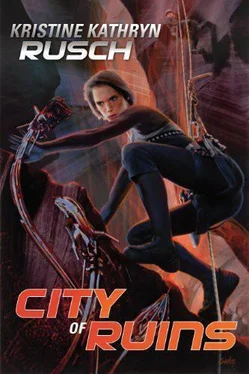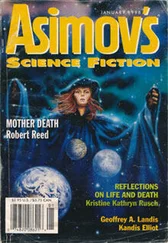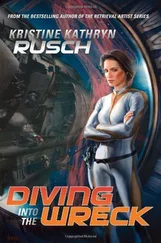“Which is?”
“She’s their leader.”
“That’s clear,” Coop said.
“But I’m not sure that’s what she said,” Perkins said. “I thought we were doing pretty well. I said my name, she responded with her title, and then I asked her where we were. The man stepped forward and introduced himself.
“I noticed that,” Coop said.
“His name sounded very different. She spoke a one-syllable word, short and curt. His name was smooth, filled with ‘ah’ sounds that blended into one another. I couldn’t tell how many syllables he used, and I’m not sure, when I repeated it back, whether or not I said it right.”
She clasped her hands behind her back and walked alongside the table, talking to herself as much as to him.
“Names are tricky,” she said. “Because they work off several traditions. Names often have a family history and go through time, all the way back to the beginning of the family. If you do a family tree, you might find that name runs through hundreds of generations. If, of course, you can trace the family back that far.”
“You think that’s the case with his name?” Coop wasn’t sure how she got that from the short conversation.
“I don’t know,” she said. “Names are the trickiest part of language because names aren’t fixed. You’re the captain. You’re Captain Cooper. You’re Jonathon Cooper. And you’re Coop. You might also be Captain Coop Cooper—”
“I get your point,” he said dryly.
“And Coop is a word. Captain is a title, a name, and a rank. Jonathon is one of the oldest names we have, going all the way back to Earth, and Earth documents centuries before space flight use that name.”
“I see,” he said, trying to move her along. “How is this tied to the woman?”
“I think the man introduced himself. And then, I think he said ‘she’s our leader.’ But he might also have just given me her name. I don’t know. What I understood is this. Imagine if you were her. You tapped herself, and said ‘Captain.’ I repeated it, not quite understanding, and gave my name. Then the man came over and introduced himself, followed by, ‘And he’s our captain.’ Or he might have said, ‘and he’s captain,’ and that was a name, not a title.”
“All right.” Coop reached out to put a hand on her shoulder, to calm the pacing. It didn’t work. She didn’t look up. “I want you to consult with Mae.”
“I plan to,” Perkins said. “I’m going to get as much help on this as possible because so far as I can tell, time is of the essence, right?”
He looked at her, feeling the irony.
“Yes,” he said. And considering that she knew that, considering how the meeting went, he asked, “Why did you leave after less than half an hour?”
First contacts could go as long as six hours, if the linguists and diplomats felt they were making progress.
Perkins looked at him, a frown creasing her brow. “The name thing. I got so confused that I wasn’t sure what I was doing. If I was truly misunderstanding everything, then I was just making the situation worse.”
He had never heard her say anything like that before. Perkins had been his most fearless linguist, one Mae worried about because she was afraid that Perkins might inject a misunderstanding into a conversation, due to arrogance.
“You’re thinking of the Quurzod, aren’t you?” he asked.
“If someone like Mae can make a mistake that big, one that would lead to them firing on us, imagine what I can do here.”
Coop shook his head. “What happened with the Quurzod was much more complicated than translations gone wrong. When we get back to the Fleet, I’m going to talk with the command center. I think the Xenth set us up. I think the error occurred long before Mae and her team embedded themselves in that Quurzod village.”
“But you don’t know, do you, sir?” Perkins said, suddenly sounding formal.
“I know enough to know that the problem was not with the linguists,” he said. “The problem was with the diplomats. We’re not even to that stage here. I need you to talk with the outsiders. I need you to figure out who the outsiders are.”
“So we can get back to the Fleet,” Perkins said.
“So that we can try,” he said.
He sighed for a moment, thinking of all the difficulties he had left behind. If he never returned to the Fleet, they would move on, and the problems with the Quurzod would evolve into a full-scale war, one he could actually prevent. Tiny details, important details.
He felt a sudden urgency, and then tamped it down. He couldn’t focus on that. He had to think of his own crew, his own timeline, his own future.
“When do you think I can talk to them?” he asked.
Perkins looked at him, surprise all over her face. He had never before asked to speak to a first contact before the language issues were sorted out.
But this wasn’t about the language. It wasn’t even, really, about a proper first contact. If things worked out right, he would never see these people again
“Sir,” she said, speaking slowly, as if to keep her surprise under control, “this could take weeks.”
“Not if the language is related.”
She bit her lip and tilted her head in an acknowledgment that could mean yes or could mean no.
Finally she said with a firmness she had never used before, “I said I’m guessing.”
He felt a touch of color warm his cheeks. He had vowed he wasn’t going to let the crew know about his impatience, and then he had revealed it to Perkins. “The sooner we can question them about substantive things, the better off we are.”
“I know, sir,” she said, “but it’s better to understand them than to guess, don’t you think?”
He nodded, reluctantly. He wanted that conversation, and he wanted it soon. Just like he wanted the ship repaired. Just like he wanted to know when they were.
“Good work,” he said to Perkins. “Let me know when you have enough of the language to act as a translator.” “I will, sir,” she said.
I hope it’s soon, he almost said, but didn’t. I really, really hope it’s soon.
~ * ~
We don’t have linguists; we have historians and archeologists, and they have studied languages only so that they can understand the things that they find. I want a linguist, because my historians and archeologists disagree about what they’ve heard.
We’re sitting in the large room of my suite, which I’m beginning to hate. I had hoped we’d meet the crew of the Dignity Vessel, we’d talk, and we’d all learn something. I’d dreamed that I would be able to convince them to come back to the Nine Planets with us and see the other Dignity Vessels, help us figure out how to use them, and warn the Dignity Vessel crew about the Empire.
Of course, I knew that such a scenario was hopelessly naive, which is why I haven’t admitted it to anyone. But dreams can be such powerful things.
I was excited while we were in that large room, but I’m a bit wary now. Wary and exhausted. It’s clear to me that we have a lot of work ahead, and that work involves painstaking effort on both sides.
It also involves remaining on Vaycehn for several weeks, if not several months.
I have ordered Ilona to look at renting a house or an office for us, to cut down on expenses. She’s doubtful this can happen, simply because the Vaycehnese do not want us to have free rein in their city. No one from our team can get near the death hole site even now, and someone has been following a few of the historians.
We have to watch our step, and we have to be cautious about where and when we discuss the Dignity Vessel. We keep scanning our rooms to make sure no one is recording us here or watching us without our permission.
Читать дальше











